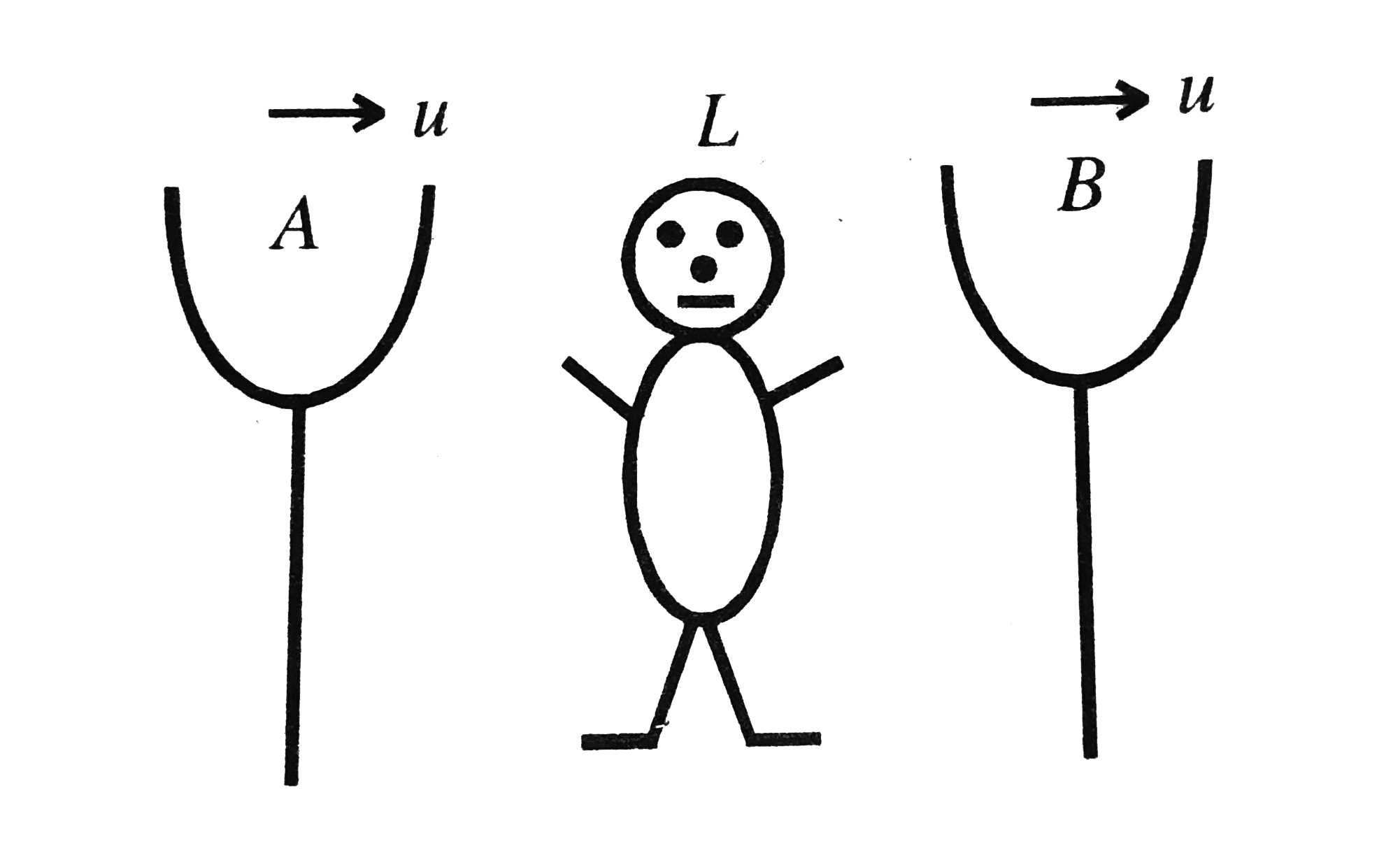Two identical tuning forks vibrating at the same frequency 256 Hz are kept fixed at some distance apart. A listener runs between the forks at a speed of 3.0ms−1 so that he approaches one tuning-fork and recedes from the other. find the beat frequency observed by the listener. Speed of sound in air =332ms−1.
 .
.
The correct Answer is:D
Here given veolocity of he sources vs=0.<br>velocityoftheobserverv_0=3m/s<br>So,theapparentequencyheardbytheman<br>=((332+3)/332)xx256=258.3 Hz<br>Fromtheapparoχngtun∈gfork=f^1<br>Similarlyf^11=((332-3)/332)xx256<br>=253.7 Hz<br>So,beat∏ucedbythem<br>=258.3-253.7=4.6Hz
Topper's Solved these Questions
Similar Questions
 Two tuning forks A and B are vibrating at the same frequency 256 Hz. A listener is standing midway between the forks. If both tuning forks move to the right with a velocity of 5ms, find the number of beats heard per second by the listerner (speed of sound in air is 330ms).
Two tuning forks A and B are vibrating at the same frequency 256 Hz. A listener is standing midway between the forks. If both tuning forks move to the right with a velocity of 5ms, find the number of beats heard per second by the listerner (speed of sound in air is 330ms).
View Solution Two tuning forks A and B are vibrating at the same frequency 256 Hz. A listener is standing midway between the forks. If both tuning forks move to the right with a velocity of 5ms, find the number of beats heard per second by the listerner (speed of sound in air is 330ms).
Two tuning forks A and B are vibrating at the same frequency 256 Hz. A listener is standing midway between the forks. If both tuning forks move to the right with a velocity of 5ms, find the number of beats heard per second by the listerner (speed of sound in air is 330ms).
View Solution
Knowledge Check
A person is observing two trains, one is approaching him with a velocity of of 4 m/s while the other is receding from him with the same velocity. IF both the trains blow their respective whistles of frequency 240 hertz, the beat frequency heard by the observer will be (speed of sound in air = 320 m/s)
A6B3CzeroD12
A small source of sound vibrating at frequency 500 Hz is rotated in a circle of radius 1002π cm at a constant angular speed of 5-0 revolutions per second. A listener situates himself in the plane of the circle. Find the minimum and the maximum frequency of the sound observed. Speed of sound in air =332ms−1.
View SolutionTwo tuning forks A and B having a frequency of 500 Hz each are placed with B to the right of A. An observer in between the forks in moving towards B with a speed of 25 m/s. The speed of sound is 345 m/s and the wind speed is 5 m/s from A to B. Calculate the difference in the two frequencies heard by observer.
View SolutionA tuning fork is vibrating at frequency 100Hz. When another tuning fork is sounded simutaneously.=, 4 beats per second are heard. When some mass is added to the tuning fork of 100Hz, beat frequency decreases. Find the frequency of the other tuning fork.
View SolutionHow far does the sound travel in air when a tuning fork of frequency 500 Hz completes 25 vibrations ? Velocity of sound in air is 332 ms−1.
View SolutionA tuning fork vibrates at 264Hz. Find the length of the shortest closed organ pipe that will resonate with the tuning fork. Speed of sound in air is 350ms−1.
View SolutionTwo tuning forks with natural frequencies 340HZ each move relative to a stationary observer . One forks moves away from the oberver while the other moves towards him at the same speed . The observer hears beats of frequency 3HZ . Find the speed the of the tuning fork (velocity of sound in air is 340m/s) .
View SolutionTwo tuning forks A and B lying on opposite sides of observer 'O' and of natural frequency 80Hz move with velocity 10m/s relative to stationary observer O. Fork A moves away from the observer while the fork B moves towards him. A wind with a speed 10m/s is blowing in the direction of motion of fork A. Find the beat frequency measured by the observer in Hz. [Take speed of sound in air as 340m/s].
View Solution
